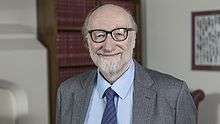Tony Greaves, Baron Greaves
| The Right Honourable The Lord Greaves | |
|---|---|
 | |
| Personal details | |
| Born | 27 July 1942 |
| Political party | Liberal Democrats |
Anthony Robert Greaves, Baron Greaves (born 27 July 1942) is a British politician and life peer. He is a Liberal Democrat member of the House of Lords.
Education and early career
Greaves was born in Bradford, Yorkshire. He was educated at Queen Elizabeth Grammar School, Wakefield before attending Hertford College, Oxford, where he obtained a BA in Geography.[1][2] After moving to the north-west he became a member of Lancashire County Council for 25 years, and also a local councillor on Colne Borough Council and subsequently on Pendle Borough Council, on which he still retains his seat.
Community Politics
Greaves was the mover—rather than author—of a motion at the Liberal Assembly in 1970 which committed his party to pursuing community politics.[3] Confusingly the co-author of the seminal 1980 report The Theory & Practice of Community Politics, which further established the practice of community politics in the Liberal Party (and later the Liberal Democrats and provided for much of its philosophical basis, was Bernard Greaves.
House of Lords
Greaves was made a life peer on 4 May 2000 as Baron Greaves, of Pendle in the County of Lancashire.[4] He is an advocate of social liberalism, and is on record opposing some of the reforms to his party brought about by Sir Menzies Campbell and Nick Clegg.
In 2010 Greaves went on the record to express his personal frustration at the auction of a manorial title, the Lordship of Pendle, suspiciously close to his own.[5] Greaves' concerns were later shown to be legitimate when it transpired that the Lordship of the Forest of Pendle belongs to the Barons Clitheroe and forms part of the Honor of Clitheroe holdings they have held since World War II. Its sale was invalid and had not been authorised by its owners.
Criticism of sexual harassment claimants
In 2013 Lord Greaves attracted criticism for offering comment that appeared to make light of accusations, by four Liberal Democrat members, of sexual harassment by another Liberal Democrat peer, Lord Rennard. Greaves wrote on a Liberal Democrat party message board: "We don’t know the details of anything that may have happened. But it is hardly an offence for one adult person to make fairly mild sexual advances to another. What matters is whether they are . . . rebuffed. In passing, I would note and guess that if the allegations as made are a matter for resignation, perhaps around a half of the male members of the Lords over the age of 50 would probably not be seen again."[6]
In 2015 he described complainants—who had all by then resigned from the Liberal Democrats—of having 'a deliberate vendetta' against Rennard, writing "I certainly accuse some of the women of not telling the truth and of a deliberate vendetta where the facts became lost in the fog of vitriol."[7]
Lib Dem Voice ban
In 2015 Greaves received a ban (subsequently lifted) from using the Liberal Democrat Voice website on the grounds of not apologising for being abusive towards the site's editorial team, becoming the first Liberal Democrat parliamentarian to receive such censure.[8]
References
- ↑ "Greaves". Who's Who 2009. Oxford University Press. December 2008. Retrieved 5 February 2009.
- ↑ Hartley-Brewer, Julia; Woodward, Will (31 March 2000). "The new intake". The Guardian. Retrieved 23 September 2008.
- ↑ "Tony Greaves". Lib Dem Voice.
- ↑ The London Gazette: no. 55843. p. 5076. 9 May 2000.
- ↑ "Oh Lord! Pendle title is up for grabs to highest bidder". Lancashire Telegraph. 5 January 2010.
- ↑ "'It's hardly Jimmy Savile'... How Clegg loyalist dismissed the sex assault claims against peer". Tamara Cohen, Tim Shipman, Francesca Infante and Ian Drury for the Daily Mail. Daily Mail. 25 Feb 2013.
- ↑ "Lord Rennard steps down from Lib Dem executive". Frances Perraudin. The Guardian. 17 Nov 2015.
- ↑ "Liberal Democrat Voice editor replies to Lord Greaves". Caron Lindsay. Lib Dem Voice. 9 August 2015.
External links
- Lord Greaves profile at the Liberal Democrat website